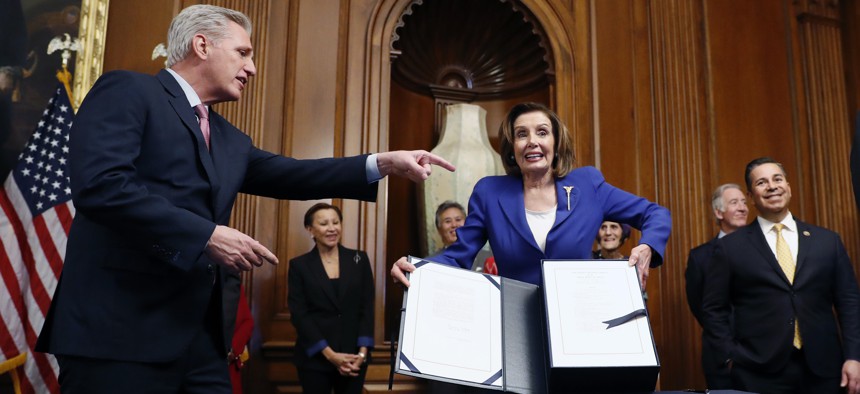Trump Signs Coronavirus Aid Package—But Democrats Say More Help Needed for States and Cities

House Speaker Nancy Pelosi, accompanied by House Minority Leader Kevin McCarthy, and other legislators, participate in a bill enrollment ceremony for the CARES Act, after it passed in the House, on Capitol Hill, Friday, March 27, 2020 in Washington. AP Photo/Andrew Harnik
The House approved the Coronavirus Aid, Relief, and Economic Security Act on Friday and President Trump later signed the measure into law. But lawmakers said they expect to address the growing financial needs of local governments in a fourth bill.
President Trump on Friday signed the historic $2 trillion economic relief package meant to provide funding for hospitals, businesses, and state and local governments financially affected by the coronavirus pandemic.
The wide-ranging bill is the largest emergency aid package ever passed by Congress, but as they passed the measure House Democratic leaders said more money will be necessary to fully address the economic crisis brought on by the outbreak and indicated they intend to pursue additional funding for state and local governments in a subsequent bill.
Included in the Coronavirus Aid, Relief, and Economic Security (CARES) Act is $290 billion to cover direct payments of $1,200 to many American taxpayers, $260 billion to expand unemployment benefits, $180 billion in hospital and healthcare related spending, as well as $510 billion for loan and loan guarantees for businesses and state and local governments. The measure also includes an additional $150 billion that provides direct aid to state and local governments.
Out of the $150 billion economic stabilization fund for state and local governments, states are guaranteed at least $1.25 billion each though some states will receive far more. A breakdown by the National Conference of State Legislatures shows California, Texas, Florida and New York will get the most money, with each receiving between $15 billion and $7.5 billion.
Ahead of Friday’s vote, House Speaker Nancy Pelosi said lawmakers would aim to address known shortfalls in a fourth bill to be taken up at a later time.
“We know we must do more. We know that this cannot be our final bill,” Pelosi, a California Democrat, said on the House floor. “For our fight against the coronavirus our state and local governments will need vastly more support for preventing and caring for and responding to the crisis.”
Economists and budget officers have warned that state and local governments are currently absorbing the brunt of the costs associated with responding to the outbreak.
In addition to spending more during the outbreak to fund unemployment or to purchase personal protective equipment, state and local governments will also eventually face reduced tax revenues along with the economic downturn, as personal income taxes and sales taxes decline.
The $150 billion for state and local governments will likely not be enough to close the expected gap in lost revenue, said Tim Bartik, a senior economist with the W.E. Upjohn Institute for Employment Research.
“Own-source general revenue for state/locals is about $2.4 trillion annually. If this declines by 10% then the revenue hole is $240B,” Bartik wrote on Twitter.
In addition to added expenditures, he estimated state and local governments could easily need $400 billion to cover annual expenses.
Economists at the Economic Policy Institute similarly said state and local governments “will clearly need substantially more federal support to avoid being a drag on recovery later in the year.”
The needs of state governments will vary depending on the extent of infection in their communities, as well as the impacts the outbreak has on prominent industries in their region. Because of this, federal aid would be most useful if state and local governments are given flexibility to use federal dollars that have already been appropriated, wrote Brookings Institution economists this week. They advocated for the federal government to provide more funding through community block grant programs or by picking up the entire tab for Medicaid expenditures for the duration of the pandemic.
The coronavirus aid package is the third bill passed by Congress in response to the growing pandemic.
OTHER STORIES on Route Fifty:
-
‘We’re Doing What We Can’: How a Makeshift Network Is Filling in the Gaps with Medical Supplies
-
Some States Stall Plastic Bag Bans During Coronavirus Outbreak
-
Nearly 200 Cities Short on Supplies for Dealing With Coronavirus, Mayors Report
-
$60 for Toilet Paper? How Attorneys General Are Fighting Price Gougers
NEXT STORY: California, New York Extend Mortgage Relief to Homeowners





